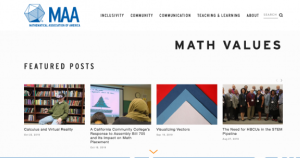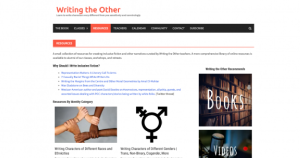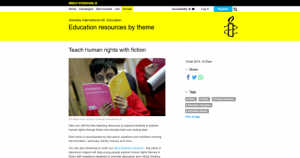General Interest
Back to Top
|
 |
|
Poetry in Science
|
Language Arts |
|
Literature enthusiasts and science aficionados alike may appreciate Poetry in Science, an ongoing collaboration between Nautilus Magazine (featured in the 2-06-2015 Scout Report) and the public television series and educational initiative Poetry in America. Launched in May 2019, Poetry in Science aims to "illuminate the rich shared history of poetry and science in [the United States]," in an effort to offer its audience "new ways to learn about and enjoy scientific topics." This project features video conversations between Elisa New, the creator of Poetry in America and a Harvard University English professor, and various scientists, public figures, and poets. For example, in a July 2019 post, New meets with ornithologist Scott Edwards to discuss "You'll know her by her foot," one of Emily Dickenson's bird poems. In addition to these conversations, Poetry in Science also features short essays written by Poetry in America staff, such as Frank Cahill's examination of Marianne Moore's poem "The Fish," as well as posts revisiting previously published Nautilus articles that also explored intersections between poetry and science. [JDC] |
|





|
|
 |
|
ELI: Climate Change Curriculum
|
Science |
|
Middle school STEM teachers may be interested in this free climate change curriculum developed by the Environmental Literacy and Inquiry (ELI) Working Group at Lehigh University. Designed to take place over 21 days or class sessions, this technology-supported curriculum "focuses on essential climate literacy principles with an emphasis on weather and climate, Earth system energy balance, greenhouse gases, paleoclimatology, and how human activities influence climate change." Throughout the curriculum's six thematic units, students complete inquiry-based lab activities using tools such as Google Earth, a web-based carbon calculator, and a geologic timeline to investigate these interrelated climate change topics. This comprehensive, standards-aligned curriculum provides all the necessary instructional materials and supporting information, including an instructional framework and sequence, assessments (including a pre- and post-test), Google Earth files, videos, PowerPoint files, handouts, and homework readings, as well as resources for students and background information for each topic. ELI advises that these curricular materials work best using Google Earth version 5.2 or newer and Firefox. It should be noted that access to the assessment files requires a login, which interested teachers can acquire for free by emailing a request to the contact email found in the site's footer. [JDC] |
|





|
|
 |
|
The Global Countryside: Rural Change and Development in Globalization (Global-Rural)
|
Social studies |
|
The Global Countryside: Rural Change and Development in Globalization (Global-Rural) was a major research project based at Aberystwyth University in Wales that ran from 2014-2019. As its name suggests, this project examined the myriad effects that globalization has had on rural societies and economies, using more than 35 case study locations in 14 countries around the world, including Brazil, Canada, and Malawi. Readers can peruse the extensive fruits of this research at the link above. A good place to start are the story maps, which are organized into thematic categories such as Economy and Trade (e.g. dairy, mining), Global Challenges (e.g. climate change, poverty), and Migration (e.g. forced, historical). Readers interested in viewing the project's numerous other outputs, such as data, academic publications, presentations, and more, should visit the Resources section. Those wishing to see an overview of the project's major findings should view the story map entitled "Narrating the Global Countryside," which can be accessed on the main page. Global-Rural was led by Michael Woods, a Professor of Human Geography and of Transformative Social Science at Aberystwyth University, and supported with funding from the European Research Council. [JDC] |
|





|
|
 |
|
DNAdots
|
Science |
|
Biology educators and students, as well as those curious to learn more about genetics, may want to check out DNAdots, a free educational resource created by the team at miniPCR bio. DNAdots offers its visitors "bite-sized, simple explanations of modern genetic technologies," making them excellent ways to gain a better understanding of topics such as personal genetic ancestry testing, DNA barcoding, and gene drives. They are organized into four categories: Sequencing, Gene Expression and Physiology, Genome Editing, and Synthetic Biology. Each DNAdot includes a concise, approachable explanation of what the technology is, how it works, and some of what it means in a practical sense. For those interested in reading more about a particular topic, links to several related articles (also written for general audiences) are included at the end of the explanations. Additionally, DNAdots provides several review questions to check understanding as well as critical thinking and discussion questions. Teachers interested in using DNAdots in their classroom can request answer keys for these questions via email, and each DNAdot can be downloaded as a well-formatted PDF. [JDC] |
|





|
|
 |
|
MAA: Math Values
|
Mathematics |
|
From the Mathematical Association of America (MAA) comes Math Values, a new blog launched in 2018 that "explores the diverse voices of mathematics and discusses topics related to and affected by mathematics." Here, readers will find informative articles written by professional mathematicians, math educators, and even math students. Examples of article topics include a recently implemented California law mandating a change in how community college students are placed in math courses, interviews with principal investigators of math education research projects that have received grants from the National Science Foundation, and a student's response to a paper critiquing the International Mathematical Olympiad. Math Values is organized into four thematic categories (Inclusivity, Community, Communication, and Teaching & Learning) that can be reached via a menu at the top, where readers will also find the site's search bar. Readers of past MAA blogs may also find new articles from some familiar columns here, such as Devlin's Angle and Launchings, written respectively by Keith Devlin and David Bressoud. Math Values will likely be of particular interest to STEM educators and administrators. [JDC] |
|





|
|

















